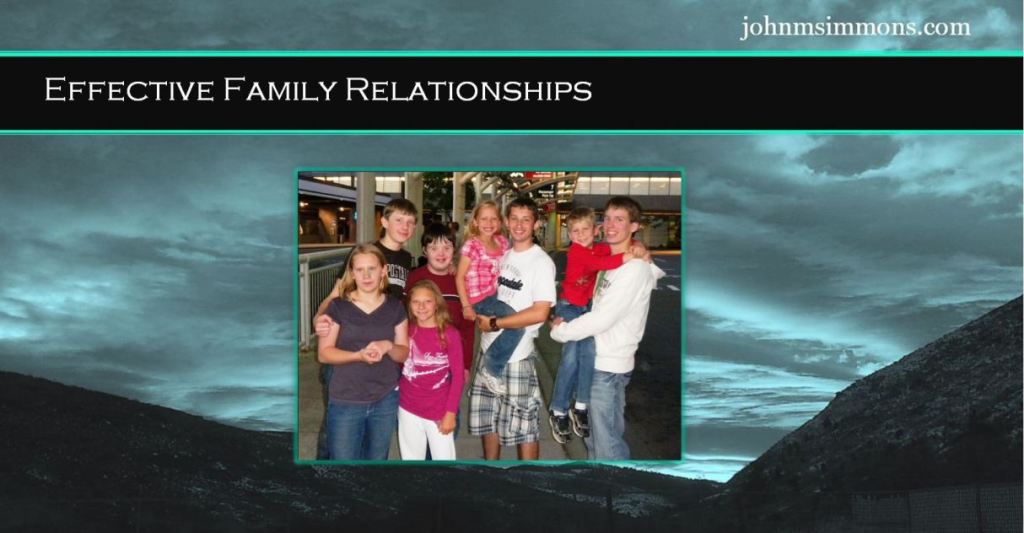Effective Family Relationships: And Keys to Success
Because we use our current family as a tool to heal and overcome devastating histories, we spend a lot of time focusing on effective family relationships.
Members of our family have quite a bit of experience with effective family relationships. Individuals have also experienced family relationships that could be the picture next to the definition of “dysfunctional” in the dictionary. My wife, Amy, grew up in a home where her father was a notorious sex-felon. He was also, (according to her mother) a suspect in murders that were later attributed to the serial killer, Ted Bundy. Amy entered the U.S. foster care system at fifteen and has lots of insight about the shortcomings of that program.
We have family members who have lived in families that were destroyed by suicide, divorce and abuse. Some people in our family have lived outside of families, in orphanages; two of them well into their teen years. Because we use our current family as a tool to heal and overcome devastating histories, we spend a lot of time focusing on effective family relationships and contrasting them against negative family experiences. We want all of our children to understand that effective family relationships don’t happen by accident.
As Amy approached marriage age, she decided that she could have the family of her dreams, even though she wouldn’t be able to be the child in that setting. With that thought in mind, she created a home that was based on effective family relationships. Our first children were loved, supported, taught, and perhaps a bit coddled and naïve. That wasn’t to last.
While our oldest children tried to help our newer children build effective family relationships, the newer children showed the others what can happen when you haven’t been raised that way.
The situation was hard to see as a two-way street at the time that children from horrific places brought their trauma and behaviors with them, into our home. While our oldest children tried to help our newer children build effective family relationships, the newer children showed the others what can happen when you haven’t been raised that way.
It’s easy to wear a martyr’s noose around your neck while seeking sympathy and faux sainthood while waiting for the gallows, but that wasn’t what I wanted for the members of our family. I wanted all of them to have effective family relationships in our current family, as well as in the families that would evolve thereafter.
The latest children to join our family brought a key to that desire, presented as a gift from a soggy and mutilated cardboard box that reeked of the filth of abuse and neglect. As much as I wanted to throw out that box, it was too late. But it brought something to my first children that could not have been obtained in another way.
My sons learned to see the value of what they had always had by watching others who had been denied such blessings. They saw in vivid detail the things that might happen to their own future families if they did not put effective family relationships high on their priority lists. And they learned the importance of family, of doing hard things and of not walking away when family needs us.
Little by little we built the foundation and then raised the walls of what we believe is a home filled with effective family relationships.
Effective family relationships have not come to us easily with the last children who joined our family. With challenges like Reactive Attachment Disorder, Post Traumatic Stress Disorder, Borderline Personality Disorder and Fetal Alcohol Spectrum Disorder we have had to work for every tiny success. Some of the things we tried half-heartedly came off as huge successes. Other attempts that we employed with great faith and hope were miserable failures. But little by little we built the foundation and then raised the walls of what we believe is a home filled with effective family relationships.
Over the next several months, we’d like to share some of our experiences in building effective family relationships with you. You’ll see articles about differences, forgiveness, patience, patterns, activities and rebuilding trust. We hope that you find value in our experiences and trust that we will learn from you as well, when you choose to share in the comments section. Please keep an eye out for these articles, or better, yet, click here to receive notifications when they post: https://johnmsimmons.com/newsletter-on-blog-posts/?permalink_name=newsletter-on-blog-posts
Often, readers receive as much help from other readers in the comments section as they do from the blog article, itself. Please be generous with your thoughts and experiences in the comments section. There are lots of people who need what you have to share. This is your chance to help them.comments matter.
Read more articles by John M. Simmons about Home and Family
Return to John M. Simmons’ blog
Ensure you don’t miss anything by signing up for Our Weekly Newsletter. This is all you need to be qualified for occasional giveaways like the Kindle Fire that Kristy Goulart won in July!

